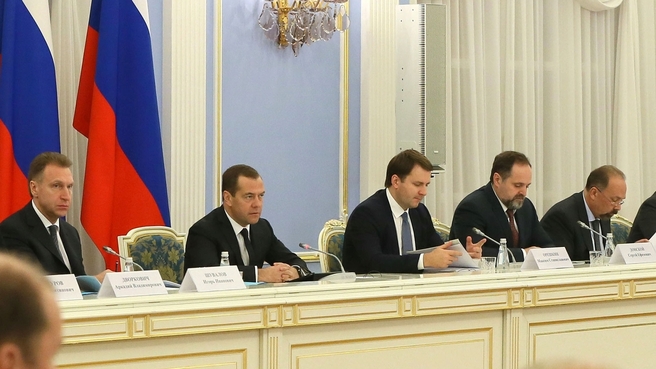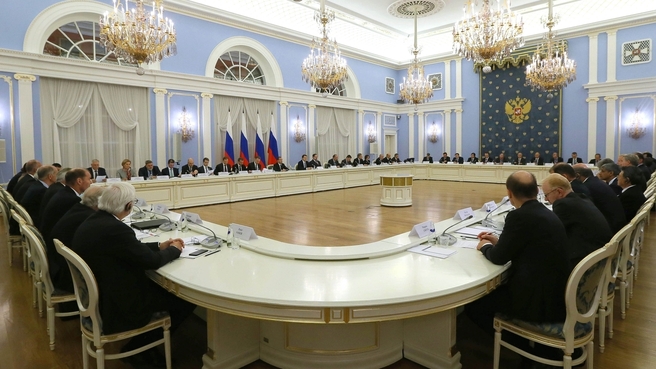The meeting participants discussed proposals for simplifying administrative procedures in various industries, including in the energy, pharmaceutical and agricultural sectors.
Dmitry Medvedev's opening remarks
Dmitry Medvedev's opening remarks:
Good afternoon, ladies and gentlemen,
I cordially welcome you to our country. Traditionally, half way through the autumn at a session of the Foreign Investment Advisory Council in Russia, we openly speak about all pressing topics as well as discuss the steps that need to be taken to implement projects by major international companies in our country.
I hope this format is also advantageous to the Government of the Russian Federation, and, of course, to the global business community, which you represent.
Retrospective
-
The 30th session of the Foreign Investment Advisory Council in Russia, 17 October 2016
-
The 29th session of the Foreign Investment Advisory Council in Russia, 19 October 2015
-
The 28th session of the Foreign Investment Advisory Council in Russia, 20 October 2014
-
The 27th session of the Foreign Investment Advisory Council in Russia, 21 October 2013
-
The 26th session of the Foreign Investment Advisory Council in Russia, 15 October 2012
This gives us an opportunity to promptly share opinions, discuss various ideas and approaches, plus get an assessment at the highest level of expertise, which may be even more important.
I would like to say a few words about the situation in Russia.
The Russian economy completed its adaptation to the new environment and challenges that it ran into, and began to grow. The key performance indicators are on the rise, including gross domestic product, industrial output, cargo turnover, as well as exports and imports. The growth rates may vary, but the dynamics are generally positive all across the board. We can safely say that the Russian economy has entered a phase of an upward trend.
This is taking place amid an all-time low inflation rate, which increasingly corresponds to the numbers typical of the developed economies. It has remained within 2 percent since the beginning of the year, 1.7 percent actually, according to Rosstat. In general, we expect moderate numbers for the rest of the year (perhaps, slightly over 3 percent). Such low inflation rates are unprecedented in our country’s recent history.
These positive changes are the result of many efforts, including the Government's anti-crisis activities, targeted support of key industries (which help achieve maximum effect for the economy in general) and, of course, our moderate budget policy.
Maintaining an effective cost structure plus implementing the development priorities which we, ladies and gentlemen, colleagues, have identified in collaboration with you, remains our main approach.
Despite the attempts to economically isolate our country, foreign investors are increasingly interested in cooperating with Russia. The volume of foreign direct investment has more than doubled over the first six months of the year compared to that of the same period last year. Our Foreign Investment Advisory Council (FIAC) has made a tangible contribution to it.
FIAC corporate members are implementing over 20 investment projects in a variety of industries (given the importance and the size of the companies represented in the FIAC, these are all major projects) ranging from energy to digital electronics. In all instances, the thing is about launching or substantially upgrading production facilities and the creation of new capacities. Innovative products are entering the market. The total volume of investments across these projects is estimated at billions of roubles. The total investment contribution of the FIAC members exceeded $165 billion over the entire period of its existence. The geographic reach of these projects includes over 50 Russian regions.
The investment flow has become possible due to focused efforts aimed at improving the business climate. Many ideas and projects in this sphere were generated by FIAC expert groups, in particular, as part of the National Entrepreneurship Initiative. We have been implementing road maps in the critical spheres of state regulation since 2012.
The results can be seen from the way our international rankings have improved. I would like to emphasise this once again. Russia demonstrated, perhaps, the most impressive rankings in the World Bank’s Doing Business rankings. Over a period of just five years, we have moved up by more than 80 positions. This is how experts assessed our efforts to simplify or speed up many procedures that matter when starting or running a new project in our country. Russia rose from 124th to 40th place among 190 countries. Of course, this in itself is very good, but it doesn’t mean that our work has come to an end and can be recognised as completed.
I will spend a moment talking about our achievements over a period of the past five years, including thanks to our meetings with you. The process of connecting to electricity grids has been made less complicated and now costs only a third of what it used to. The time it takes to register the deeds of real estate has been reduced. The procedure for obtaining a building permit was simplified due to reforms at federal and regional levels. With regard to incorporation procedures, the time involved to open a corporate bank account has been cut. The requirement to advance authorised capital prior to a company's registration has been dropped, and so on and so forth.
Measures have been implemented that have eased procedures for businesses through the introduction of online services. This year, the deadlines for linking up to water discharge systems have been significantly reduced. Requirements for industrial enterprises discharge have been brought into compliance with scientifically based indicators. An opportunity has been provided for adjusting customs declarations after releasing goods into circulation. The list of customs points for a number of goods has also been expanded. The regulations have been optimised for distribution margins for certain food products. Many other things have also been done, and in this connection I want to thank all of you, members of the Advisory Council, for the engaged dialogue with the Government of the Russian Federation.
It should also be noted that member companies of our council have actively worked to expand non-resource exports from Russia. This is one of the priorities of our economic development. We have jointly prepared a set of measures to support export-oriented companies. Certain initiatives have already received the status of a draft law. In particular, amendments have been developed to the Tax Code concerning the application of zero VAT for re-export. The document is being considered by the State Duma and we hope it will be approved.
I would like to emphasise that the obligations we took several years ago concerning the preservation of the tax burden for businesses have all been implemented. Despite the economic crisis and various problems that our economy has been facing we did not raise the overall taxes. I think this is a good achievement of the past few years that have secured a necessary stability, which, in fact, has been reflected in ratings. The Government is going to stick to this policy in the future.
To develop non-resource exports, efforts should be taken to introduce new technology and assist innovative businesses. This is what all of you are involved in one way or another. In turn, I would like to invite you to attend our specialised Open Innovations Forum that is taking place at the Skolkovo Innovation Centre. This year's discussion concerns the digital economy.
I would like to once again thank you all for your work and to add that my colleagues in the Government and I are available for frank communications and discussing any of your questions.














